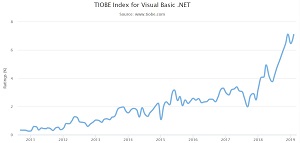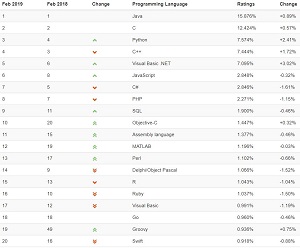News
VB.NET Popularity Still Rising
Visual Basic.NET is getting comfortable in its new position as a top five programming language in the TIOBE index, which measures popularity based on search engine data.
After hitting a high in the index a couple months ago, VB.NET features strongly in the new February 2019 report. In fact, among the top 20 languages tracked by TIOBE, VB.NET exhibited the highest growth from the previous year's rating, an increase of 3.02 percent.
 [Click on image for larger view.]
VB.NET in the TIOBE Index (source: TIOBE Index)
[Click on image for larger view.]
VB.NET in the TIOBE Index (source: TIOBE Index)
By retaining the No. 5 position and exhibiting the highest year-over-year growth percentage among the top 20 languages, VB.NET hasn't yet started on the decline previously predicted by TIOBE, which characterized VB.NET as a "toy" language last December, furthermore saying:
Microsoft's Visual Basic .NET is currently at position 5 of the TIOBE index with an all time high. This is very surprising. Professional software developers don't think much of Visual Basic. It is considered a toy language meant for people who start to learn programming. This is true, but it can't be denied that there are many programs and applications written in Visual Basic, also in the professional domain. Many dedicated office applications for small and medium enterprises have been developed with this programming language because of its rapid prototyping and because it is easy to pick up. Microsoft is slowly saying goodbye to Visual Basic by stopping the co-evolution strategy with C#. So I think the current popularity of Visual Basic will sooner or later go into decline again.
Just plain old Visual Basic, meanwhile, fell five slots from No. 12 last year to No. 17 this year, with a 1.19 percent drop in share. Another Microsoft programming language, C#, fell from No. 5 last year to No. 7 this year, with a percentage drop of 1.61 percent. TypeScript, however, has literally fallen of the chart, being delegated to a simple list of "the next 50 programming languages."
 [Click on image for larger view.]
TIOBE Index for February 2019 (source: TIOBE Index)
[Click on image for larger view.]
TIOBE Index for February 2019 (source: TIOBE Index)
The index is updated once a month with ratings based on the number of skilled engineers worldwide, courses and third-party vendors. Search engines are used to calculate the ratings. "It is important to note that the TIOBE index is not about the best programming language or the language in which most lines of code have been written," TIOBE says.
About the Author
David Ramel is an editor and writer at Converge 360.